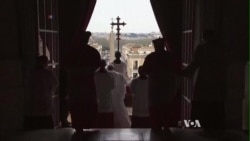Thursday’s landmark political accord on Iran’s nuclear program remains a focal point of commentary around the world. Debate on the preliminary deal will likely consume Washington when Congress reconvenes next week.
In Easter Sunday prayers, Pope Francis highlighted the accord reached in Switzerland.
“With hope we entrust to the merciful Lord the framework recently agreed in Lausanne, that it may be a definitive step toward a more secure and fraternal world.”
China’s Foreign Ministry called the deal “good news for the world.” By contrast, Israeli Prime Minister Benjamin Netanyahu remains a fierce critic of the agreement.
“This is a bad deal," said Netanyahu. "It leaves Iran with a vast nuclear infrastructure. I think, for the preeminent terrorist state of our time to have a free path, an easy path to nuclear weapons endangers Israel, endangers the region, endangers the world.”
While the accord mandates sanctions relief in return for restrictions on Iran’s atomic capabilities, it does not mean a surrender of U.S. and international leverage over Iran, according to President Barack Obama.
“Many key details will need to be finalized over the next three months, and nothing is agreed to until everything is agreed," said Obama. "And if there is backsliding, there will be no deal. If Iran violates the deal, sanctions can be snapped back in place. Meanwhile, other American sanctions on Iran for its support of terrorism, its human rights abuses, its ballistic missile program, all will continue to be enforced.”
While pledging to abide by promises made, Iranian officials make clear they expect a full and permanent end to sanctions that have battered their nation’s economy for years. But terminating, as opposed to suspending, some U.S.-imposed measures would require an act of Congress, and many in the Republican-led body remain skeptical, or even hostile, to the framework accord, meaning that the White House has work to do.
“Here in the United States, I expect robust debate," said Obama. "We will keep Congress and the American people fully briefed on the substance of the deal. As president and commander-in-chief, I firmly believe that the diplomatic option - comprehensive, long-term deal like this - is by far the best option.”
Polls show most Americans open to a negotiated settlement on Iran’s nuclear program, and many lawmakers are in their home districts meeting with constituents. Whatever messages members of Congress hear from the public could shape debate on Capitol Hill when the legislature gets back to work next week.





